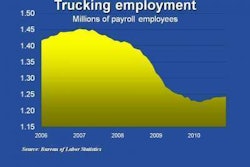FMCSA makes further CSA changes
Agency softens terminology, withholds cargo BASIC scores
The term “deficient” is no longer in the Federal Motor Carrier Safety Administration’s vocabulary when it comes to the Comprehensive Safety Analysis (CSA) – at least not in public. On Nov. 18, the agency announced additional changes to the Safety Measurement System, which was scheduled to replace SafeStat in early December. One revision changes how FMCSA presents carriers’ Behavior Analysis and Safety Improvement Categories (BASICs) scores to the public. The second recalibrates the Cargo-Related BASIC and withholds from public view carriers’ percentiles and intervention status within that BASIC.
In August, FMCSA announced various SMS revisions, including changing the measure of exposure in the Unsafe Driving, Crash Indicator and Controlled Substances/Alcohol BASICs. The agency also revised the severity weights for some roadside inspection violations and removed size and weight violations altogether, saying CSA wasn’t an effective way to address those problems.
FMCSA said its latest changes were based on feedback and analysis from the three-month data preview period that allowed carriers to see where they stood in each BASIC following the August changes. These would appear to be the final revisions in the SMS before FMCSA makes the data public, an event tentatively scheduled for Dec. 6. As CCJ went to press, however, at least one lawsuit was expected to be filed that would seek to block public disclosure of SMS percentiles and intervention status in all BASICs pending a rulemaking.
Mostly about the public
In presenting SMS data to the public, instead of “deficient,” FMCSA said Nov. 18 that it will use the term “alert” when a carrier’s scores exceed the intervention threshold within a particular BASIC. In addition, the highlight color will change from red to orange, and the language will change to clarify that BASIC results signify the carrier is prioritized for an FMCSA intervention. FMCSA said the feedback was that the public display of SMS results should indicate that BASIC percentiles over the threshold signify the carrier is prioritized for an FMCSA intervention, but “not signify or otherwise imply a ‘safety rating’ or safety fitness determination.”
FMCSA’s second revision stems, in part, from the SMS changes it made in August. When the agency decided to remove vehicle size and weight violations from the Cargo-Related BASIC, carriers with other types of violations – especially flatbed and hazardous materials operations – instantly fared worse in the safety event grouping for that BASIC.
The agency said feedback from the three-month preview following the August changes “identified a concern that the BASIC was over-representing certain industry segments and potentially creating a misleading safety alert warning.” In response, FMCSA analyzed those concerns and concluded that the Cargo-Related BASIC should be recalibrated based on input on the cargo securement severity weights.
FMCSA’s other steps regarding the Cargo-Related BASIC directly address the public disclosure concerns raised by flatbed and hazmat carriers. “Also, the agency is conducting additional analysis to further understand the impact on the different industry segments of a carrier’s exposure in this BASIC,” the agency said. “During this analysis period, the BASIC results will continue to be an effective intervention prioritization tool for enforcement personnel based on sound safety principles.” So for now, the percentiles and intervention status will be accessible only to the FMCSA enforcement community and motor carriers.
The American Trucking Associations endorsed FMCSA’s changes. “ATA continues to support the objectives of CSA 2010, FMCSA’s safety monitoring and measurement program, and we are pleased with the Agency’s decision to continue working on its Cargo-Related BASIC to get it right before it’s made public,” said Bill Graves, ATA president and chief executive officer.
ATA noted that it had identified the Cargo-Related BASIC as a component of the CSA program that needed additional work and presented evidence showing that scores in that category do not accurately reflect carrier safety performance. The association also said it agrees with FMCSA’s decision to change “deficient” to “alert” on its public website “and to include pop-up disclaimer language alerting users to the intent of the scores, and cautioning against misuse.” FMCSA now plans to withhold scores in two BASICs – Crash Indicator and Cargo-Related – of the seven in CSA.
Headed to court?
For some in the industry, FMCSA’s concerns about the impact on various industry segments holds true for all of the BASICs in CSA. Barring any further changes by the agency, at least three groups – the National Association of Small Trucking Companies, the Expedite Alliance of North America and Air & Expedited Motor Carriers Association – planned to file a lawsuit by the end of November to block public disclosure as currently planned. Just as flatbed and hazmat carriers argued that the SMS hurt them, the associations argue that FMCSA needs to look at the impact on small businesses as a segment. They point to various aspects of the SMS methodology that make the results unsuitable for comparing and contrasting carriers.
Although FMCSA plans a rulemaking next year to rate carriers based solely on the SMS, public disclosure will have a major impact on carriers, the groups argue. Due to vicarious liability concerns, shippers and brokers will need to avoid carriers listed as deficient or who otherwise are labeled as less than safe, they argue. Otherwise, plaintiffs in crash lawsuits could be able to claim that the shippers and brokers were negligent.
 FMCSA’s latest changes to the CSA methodology address flatbed carriers’ arguments that some violations carried inappropriate severity weights and put them at an unfair disadvantage – especially after the agency removed size and weight violations from the program.
FMCSA’s latest changes to the CSA methodology address flatbed carriers’ arguments that some violations carried inappropriate severity weights and put them at an unfair disadvantage – especially after the agency removed size and weight violations from the program.In September, the three associations filed a motion with FMCSA to postpone public release of CSA data pending completion of rulemaking on the safety fitness determination aspects of the initiative. Alternatively, they asked that FMCSA release only accumulated safety data as the Freedom of Information Act may require, redacting any characterization of a carrier based upon such data as well as a percentile ranking. In addition, FMCSA should issue a statement affirming that in the absence of an administrative final rulemaking, the agency is monitoring the activity of all interstate carriers and that shippers and the traveling public may rely upon the agency’s ultimate fitness determination as a certification for use, they said.
In early October, after meeting with FMCSA officials, the groups offered an alternative to the motion to postpone, offering specific disclaimer language to counter the vicarious liability risk and removing from public release any characterization of carriers exceeding intervention thresholds as marginal, deficient “or any other pejorative term.”
The changes FMCSA made Nov. 18 are insufficient, the three associations say. “Changing the color from red to orange and changing the terms from ‘deficient’ or ‘marginal’ to ‘alert’ do not begin to address the possible misuse of CSA 2010 by the plaintiff’s bar,” said Henry Seaton, legal counsel for the three associations considering a lawsuit. The changes do not alleviate vicarious liability concerns “or put an end to the prospective black-balling of carriers by shippers and brokers when those carriers are in fact certified by the FMCSA as safe to operate,” Seaton said. “Moreover, the fact that the agency has now agreed not to publish percentile scores in yet a second BASIC area begs the question – why publish any percentile ranking before the protections afforded by the Administrative Procedures Act have been provided to affected carriers, shippers and brokers.” n
IN BFRIEF
* The bipartisan National Commission on Fiscal Responsibility and Reform, created by President Obama to address the nation’s fiscal challenges, recommended a gradual increase in the gas tax by 15 cents beginning in 2013 to sustain the Highway Trust Fund and pay for transportation spending.
* UPS is selling its UPS Logistics Technologies unit to Thoma Bravo, a private equity investment firm. The company, which creates high-tech transportation routing and fleet management systems, will transition its name to Roadnet Technologies Inc. after completion of the acquisition, which is expected to close by Dec. 31.
* Lithonia, Ga.-based James Brown Contracting Inc. (Brown Trucking), a Southeast dedicated short-haul truckload carrier, acquired Durham, N.C.-based transportation provider West Brothers’ Companies. The acquisition gives Brown Trucking a total of 810 trucks and 3,500 trailers and comes on the heels of its September acquisition of dry-van truckload carrier Schrader Trucking.
* P.A.M. Transportation Services Inc. announced that its primary operating subsidiary, P.A.M. Transport Inc., received authorization from the Mexico Department of Economy to establish a network of offices in Mexico.
* J .B. Hunt Transport Services Inc. announced that Kirk Thompson would step down as president and CEO on Dec. 31 and would become board chairman Jan. 1, 2011, replacing Wayne Garrison, who will remain a director. Thompson will be succeeded as president and CEO by John Roberts, who currently serves as president of Dedicated Contract Services.
YRC units seek to dismiss ABF complaint
YRC Worldwide announced Nov. 16 that three of its subsidiaries filed a motion to dismiss a complaint filed by ABF Freight System Inc., which alleges a violation of the National Master Freight Agreement between the subsidiaries and the International Brotherhood of Teamsters. YRC Inc., New Penn Motor Express Inc. and USF Holland Inc. asked the U.S. District court for the Western District of Arkansas to dismiss ABF’s complaint because ABF is not a party to the NMFA and has no standing to challenge its amendments.
 ABF Freight System’s complaint argues that concession agreements between the Teamsters union and three YRC Worldwide entities violate the National Master Freight Agreement.
ABF Freight System’s complaint argues that concession agreements between the Teamsters union and three YRC Worldwide entities violate the National Master Freight Agreement.ABF Freight System’s complaint argues that concession agreements between the Teamsters union and the YRC Worldwide entities violate the NMFA, the collective bargaining agreement covering most unionized trucking, including drivers and dockworkers nationwide. ABF argues that the union violated the NMFA in 2009 and 2010 by entering into concessionary side agreements with the YRC Worldwide companies to the exclusion of ABF and other companies signatory to the NMFA; these agreements led to ongoing significant wage and benefit reductions and other economic concessions that were applied only to the YRC Worldwide companies.
ABF, with more than 8,000 union employees, argues the third and latest amendment to the NMFA – negotiated between the YRC Worldwide entities and the Teamsters in late September and ratified by union members Oct. 30 as part of a restructuring plan aimed at saving both the company and more than 25,000 union jobs – will “provide further wage, benefit and work rule changes that are expected to generate an average of $350 million in annual savings through the end of the extended agreement.” ABF also seeks financial damages in an amount estimated to be about $750 million by the time the NMFA is set to expire on March 31, 2013.
Meanwhile, the Teamsters National Freight Industry Negotiating Committee said Nov. 17 that it had been advised by YRC Inc. that the company would be making a multiregion “change of operations” that would affect several hundred union members throughout the United States and potentially close 31 small- and medium-sized terminals in three of the four Teamster regional areas in which it operates. “At this time, no hearing has been scheduled and will likely not be scheduled prior to the holidays as YRC needs to meet with each affected local union as a first step in the process,” said Tyson Johnson, TNFINC co-chair.
Election reshapes House transportation panel leadership
Florida Republican Rep. John Mica is set to take over as chairman of the House Transportation & Infrastructure Committee when the next Congress convenes in January following the Republicans’ takeover of control of the House of Representatives in the Nov. 2 election.
A much bigger surprise, however, was that the current committee chairman, Rep. James Oberstar (D-Minn.), lost his House seat to Republican Chip Cravaack. Rep. Nick Rahall (D-W.Va.) easily won reelection and presumably will take the reins as ranking minority leader of the Transportation & Infrastructure Committee.
Rep. John Duncan (R-Tenn.), the current ranking minority leader on the highways and transit subcommittee, easily won reelection, as did Rep. Peter DeFazio (D-Ore.), who currently chairs the subcommittee.
Meanwhile, the Senate remained in Democratic control. Although that limits the ability of Republicans to push through its agenda, which would be subject to presidential veto anyway, control of the House allows Republicans to introduce issues into final legislation.
Meanwhile, California voters on Nov. 2 solidly rejected Proposition 23, a ballot measure that would have suspended enforcement of the state’s program of reducing greenhouse gas (GHG) emissions until the state’s unemployment rate dropped to 5.5 percent or less for a year. If passed, Proposition 23 could have delayed enforcement of the regulation to reduce GHGs from certain heavy-duty tractors and trailers. That regulation will continue, as the California Air Resources Board is considering changes to the rules.











